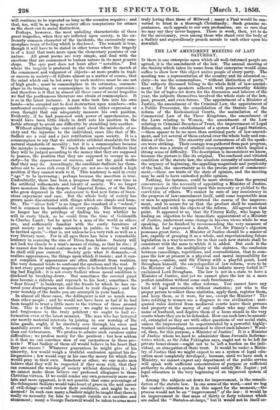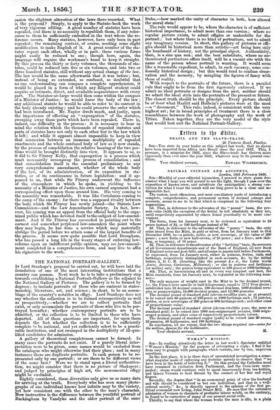THE LAW AMENDMENT MEETING OF LAST SATURDAY.
IF there is one enterprise upon which all well-informed people are agreed it is the amendment of the law. The annual meeting of the Society which takes its name from that enterprise would alone suffice to show how this object unites people of every party. The meeting was a representation of the country and its educated so- ciety—to use the commonplace, "without distinction of party." The subjects discussed belong to the whole field of law-amend- ment; for if the speakers adhered with praiseworthy fidelity to the list of topics set down for the discussion and labours of the year, the subjects themselves involved the whole state of the law, past, present, and even future. The appointment of a Minister of Justice, the amendment of the Criminal Law, the appointment of a Public Prosecutor, the consolidation of the Statute Law, the reform of the Ecclesiastical Courts, the assimilation of the Commercial Law of the Three Kingdoms, the amendment of the Laws relating to Women, the amendment of the Law relating to Criminal Breaches of Trust, the improvement of Legal Education, and the establishment of a system of Legal Statistics, —these appear to be no more than sectional parts of law-amend- ment, and yet several of them extend over the whole body and con- dition of the law. The sincerity and earnestness of all the speak- ers were striking. Their courage was gathered from past progress, yet there was a strain of studied encouragement which implied a strong sense of difficulty. The description is inconsistent we know, because the picture is like its original. The confused and vitiated condition of the statute law, the absolute necessity of amendment, the urgency of beginning the appalling magnitude and perplexity of the task, the uncertainty as to the precise point of commence- ment,—these are traits of the state of opinion, and the meeting may be said to have embodied public opinion. Nothing, for instance, could be more obvious than the general concurrence in the necessity of appointing a Minister of Justice. Every speaker either insisted upon this necessity or yielded to the conviction of others. We ,cannot be sure of any consistency in the progress of law-amendment itself, until some responsible man or men be appointed to superintend the course of the improve- ment, and to secure for us that the product shall be consistent with itself and with the objects of the reform. All agreed on that point. It appeared to us, that Sir Fitzroy Kelly, who began by iHnding an objection to the immediate appointment of a Minister of Justice, underwent some change in his own views while he was speaking, for he finished by recommending the very measure of which he had expressed a doubt. Yet Sir Fitzroy's objection possesses great force. A Minister of Justice should be a master of law, capable of grasping it as a whole and superintending future legislation in away to secure for us that each new statute shall be consistent with the mass to which it is added. But such is the state of our law, the multiplicity of the statutes, the confusion between cancellings, repetitions, and contradictions, that to com- pass the law at present is a physical and moral impossibility for any man,---unless, said Sir Fitzroy with a pla point, Lord Brougham himself, the encyclopasclist of law r orm, were to be the Minister of Justice. "God in his infinite mercy forbid it I" exclaimed Lord Brougham. The law is not in a state to have a Minister of Justice, and yet we cannot place the law in a more perfect condition without some such functionary. So with regard to the other reforms. You cannot have any kind of legal mensuration without statistics ; yet who is the proper person to collect these statistics, apply them register them, and keep them, as it were, for use, except the ilimster ? The laws relating to women are a disgrace to our civilization : anti- quated rules derived from inedireval courts leave their persons
and property at the i mercy of any ruffian who may abuse the name of husband, and deprive them of a locus stanch n the very courts where they are to be defended. How can such laws be amend- ed, entangled as they are with other questions of our social state, unless the improvement be superintended by a powerful highly- trained understanding, accustomed to direct such labours ? Want- ed, then, for this purpose, a Minister of Justice ! It is a Minister of Justice whom we need to administer those Juvenile Reforma- tories which, as Sir John Pakiiagton says ought not to be left for private benevolence—ought not to be left a burden on the indi- vidual, an abnegation of State trust. It would, be under a Minis- try of Justice that we might expect to see a system of legal edu- cation most completely developed; because, until we have such a Ministry, we cannot expect any department of the public service will speak with sufficient concentration of purpose or sufficient authority to obtain a system that would satisfy Mr. Napier ; yet legal education is the very beginning of an improved system of law.
Among the subjects set down for improvement, is the consoli- dation of the statute law. In one sense of the word,—and we beg the reader's attention to it in this aspect for the moment,—the process would not be an "improvement ', of the law : it would be an improvement in that mass of thirty or forty volumes which are called the "Statutes-at-large," but it would not in itself oc- elision the slightest alteration of the laws there recorded. What is the proposal? Simply, to apply to the Statnte-book the work of very vigorous editing. A great number of statutes have been
repealed, and there is no necessity them, if any refer- ences to them be sufficiently embodied in the text where the _re- ference occurs. Many statutes, however, have only been in part repealed ; the remaining context, of course, needing some slight modification to make English of it. A great number of the sta- tutes repeat each other, wholly or in part: these various forms might easily be redLed to one ; though here, again, the language will require the workman's hand to keep it straight. By this process the thirty or forty volimies_, the thousands of sta- tutes' could be reduced into five or six volumes, and into two or three hundred statutes, stall without any actual change of the law. The law would be the same afterwards that it was before ; but, instead of being so extended, so confused, so doubtful that no one understanding can compass a complete apprehension, it would be placed in a form of which any diligent student could acquire an intimate, direct, and available acquaintance with every part. The Statutes-at-large would then come within the compass of a Minister of Justice : he would know the body of the law ; any additional statute he -would be able to refer to its context in the body already existing ; and he could preserve the order which had been introduced. Mr. Napier dwelt much, and justly, upon the importance of effecting an " expurgation " of the statutes, sweeping away those parts which have been repealed. There is, indeed, one difficulty in the process: it is necessary to bear in mind the relation which the thousands of repealed statutes and parts of statutes have not only to each other but to the law which is left; and while it appears almost impossible to keep in view that connexion between an immense multiplicity of repealed. enactments and the whole confused body of law as it now stands, by the process of consolidation the relative bearing of the two per- taons would be brought distinctly into view. It appears to us, as it did to Sir Fitzroy Kelly, that expurgation is a process which must necessarily accompany the process of consolidation ; and that consolidation itself is the essential preliminary to any very comprehensive amendment, whether of the whole body of the law, of its administration, of its exposition in sta- tistics, or of its continuance in future legislation: and. it ap- peared to us, that while Sir Fitzroy underwent the influence of the atmosphere in which he spoke, in. yielding to the necessity of a Minister of Justice, his own earnest argument had a corresponding effect upon those around him. His very coming to the assembly was remarkable. It was like Coriolanus coming to the camp of the enemy; for there was a supposed rivalry between the body. which Sir Fitzroy has newly joined—the Statute Law Commission—and the Law Amendment Society. In fact, how- ever, his coming was an appeal from the official body to the orga- nized publie which has devoted itself to the subject of law-amend- ment. And if Sir Fitzroy has succeeded in pointing out to the earnest and somewhat perplexed law-amenders the point where they may begin, he has done a service which may materially abridge the period. before we attain some of the largest benefits of the process. It seems now quite possible that Lord. Brougham, who has passed a long life in the weary stages of enforcing law- reforms upon an indifferent public opinion, may see law-amend- ment completed in a comprehensive form, and may live to affix his signature to the work.



































 Previous page
Previous page